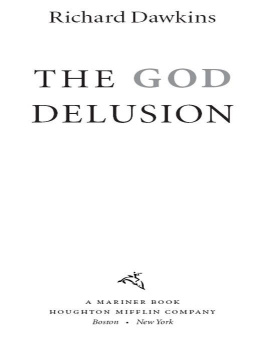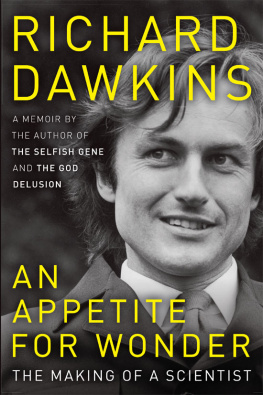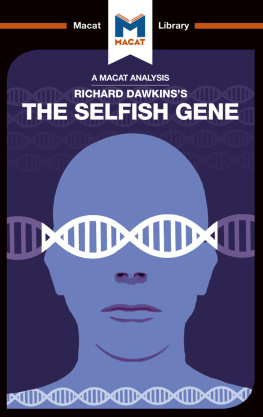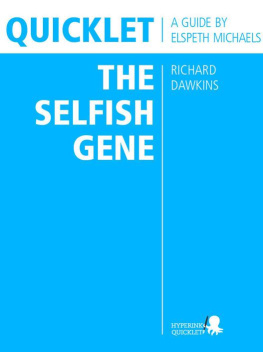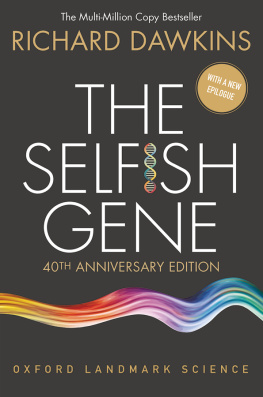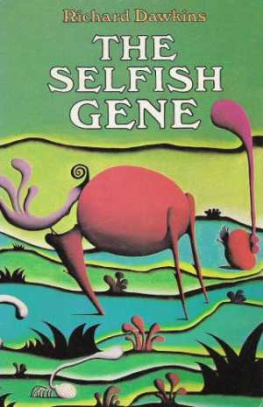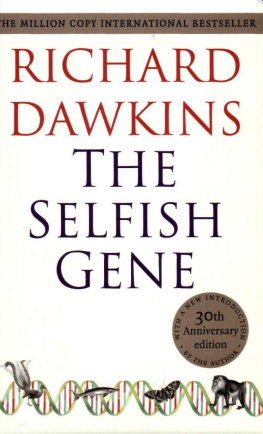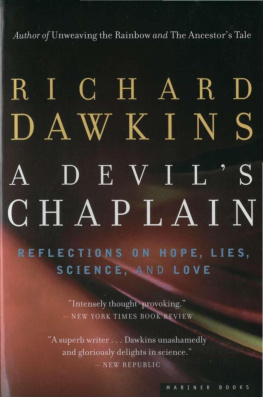The Extended Phenotype
Richard Dawkins is the first holder of Oxfords newly endowed Charles Simonyi Professorship of Public Understanding of Science. Born in Nairobi of British parents, Richard Dawkins was educated at Oxford and did his doctorate under the Nobel prize-winning ethologist Niko Tinbergen. From 1967 to 1969 he was an Assistant Professor at the University of California at Berkeley, then he returned to Oxford as University Lecturer (later Reader) and a Fellow of New College, before taking up his present position in 1995.
Richard Dawkinss bestselling books have played a significant role in the renaissance of science book publishing for a general audience. The Selfish Gene (1976; second edition 1989) was followed by The Extended Phenotype (1982), The Blind Watchmaker (1986), River Out of Eden (1995), Climbing Mount Improbable (1996), and Unweaving the Rainbow (1998). In 1991 he gave the Royal Institution Christmas Lectures. He has won many literary and scientific awards, including the 1987 Royal Society of Literature Award, the 1990 Michael Faraday Award of the Royal Society, the 1994 Nakayama Prize for Human Science, and the 1997 International Cosmos Prize.
Daniel Dennett is Distinguished Arts and Sciences Professor of Philosophy, and Director of the Center for Cognitive Studies at Tufts University. His first book, Content and Consciousness, appeared in 1969, followed by Brainstorms (1978), Elbow Room (1984), The Intentional Stance (1987), Consciousness Explained (1991), Darwins Dangerous Idea (1995), and Kinds of Minds (1996). He co-edited The Minds I with Douglas Hofstadter in 1981. He is the author of over a hundred scholarly articles on various aspects of the mind, published in journals ranging from Artificial Intelligence and Behavioural and Brain Sciences to Poetics Today and the Journal of Aesthetics and Art Criticism. His most recent book is Brainchildren: Essays on Designing Minds (MIT Press and Penguin, 1998).
The Extended Phenotype
The Long Reach of the Gene
Richard Dawkins
With a new afterword by Daniel Dennett

Oxford University Press, Great Clarendon Street, Oxford OX2 6DP
Oxford New York
Athens Auckland Bangkok Bogot Buenos Aires Calcutta
Cape Town Chennai Dar es Salaam Delhi Florence Hong Kong Istanbul
Karachi Kuala Lumpur Mumbai Madrid Melbourne Mexico City
Nairobi Paris So Paulo Singapore Taipei Tokyo Toronto Warsaw
and associated companies in Berlin Ibadan
Oxford is a registered trade mark of Oxford University Press
Published in the United States by Oxford University Press Inc., New York
Richard Dawkins 1982, 1999
Afterword Daniel Dennett 1999
First published 1982
Revised edition with new Afterword and Further Reading 1999
All rights reserved. No part of this publication may be reproduced,
stored in a retrieval system, or transmitted, in any form or by any means,
without the prior permission in writing of Oxford University Press.
Within the UK, exceptions are allowed in respect of any fair dealing for the
purpose of research or private study, or criticism or review, as permitted
under the Copyright, Designs and Patents Act, 1988, or in the case of
reprographic reproduction in accordance with the terms of the licences
issued by the Copyright Licensing Agency. Enquiries concerning
reproduction outside these terms and in other countries should be
sent to the Rights Department, Oxford University Press,
at the address above.
This book is sold subject to the condition that it shall not, by way
of trade or otherwise, be lent, re-sold, hired out or otherwise circulated
without the publishers prior consent in any form of binding or cover
other than that in which it is published and without a similar condition
including this condition being imposed on the subsequent purchaser
British Library Cataloguing in Publication Data
Data available
Library of Congress Cataloging in Publication Data
Data available
ISBN 0192880519
Typeset by Ace Filmsetting Ltd, Frome, Somerset
Printed in Great Britain by
Cox & Wyman Ltd,
Reading, Berkshire
10 9 8 7 6 5 4
Preface
The first chapter does some of the work of a Preface, in explaining what the book does and does not set out to accomplish, so I can be brief here. It is not a textbook, nor an introduction to an established field. It is a personal look at the evolution of life, and in particular at the logic of natural selection and the level in the hierarchy of life at which natural selection can be said to act. I happen to be an ethologist, but I hope preoccupations with animal behaviour will not be too noticeable. The intended scope of the book is wider.
The readers for whom I am mainly writing are my professional colleagues, evolutionary biologists, ethologists and sociobiologists, ecologists, and philosophers and humanists interested in evolutionary science, including, of course, graduate and undergraduate students in all these disciplines. Therefore, although this book is in some ways the sequel to my previous book, The Selfish Gene, it assumes that the reader has professional knowledge of evolutionary biology and its technical terms. On the other hand it is possible to enjoy a professional book as a spectator, even if not a participant in the profession. Some laypeople who read this book in draft have been kind enough, or polite enough, to claim to have liked it. It would give me great satisfaction to believe them, and I have added a glossary of technical terms which I hope may help. I have also tried to make the book as near as possible to being enjoyable to read. The resulting tone may possibly irritate some serious professionals. I very much hope not, because serious professionals are the primary audience to whom I wish to speak. It is as impossible to please everybody in literary style as it is in any other matter of taste, and styles that give the most positive pleasure to some people are often the most annoying to others.
Certainly the tone of the book is not conciliatory or apologeticsuch is not the way of an advocate that sincerely believes in his caseand I must pack all apology into the Preface. Some of the earlier chapters reply to criticisms of my previous book, which might recur in response to the present one. I am sorry that this is necessary, and I am sorry if a note of exasperation creeps in from time to time. I trust, at least, that my exasperation remains good humoured. It is necessary to point to past misunderstandings and try to forestall their repetition, but I would not wish to give an aggrieved impression that misunderstanding has been widespread. It has been confined to numerically very limited quarters, but in some cases rather vocal ones. I am grateful to my critics for forcing me to think again about how to express difficult matters more clearly.
I apologize to readers who may find a favourite and relevant work missing from the bibliography. There are those capable of comprehensively and exhaustively surveying the literature of a large field, but I have never been able to understand how they manage it. I know that the examples I have cited are a small subset of those that could have been cited, and are sometimes the writings or recommendations of my friends. If the result appears biased, well, of course it is biased, and I am sorry. I think nearly everybody must be somewhat biased in this kind of way.


